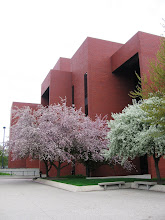Going Global: Institutional and Corporate Collaboration Advances Digital Future for Teaching & Learning
The Global Digital Library is taking shape. Mass digitization efforts are springing up everywhere, and projects like Google Book Search (http://books.google.com) and the Open Content Alliance (www.opencontentalliance.org) are moving quickly to create huge, searchable collections of digitized books available via the Internet.
These massive digitization projects provide unparalleled, 24/7/365 access to books and other materials from some of the world’s most important research libraries and centers. For Ball State University’s students and faculty, these projects represent a wide-open portal into an expanding universe of information and unprecedented opportunities for knowledge discovery. The University Libraries are utilizing these resources, promoting access to the rich and often rare collections of important materials for teaching, learning, and research.
Google Book Search currently offers cover-to-cover viewing and searching of 525,000 public domain books. One can find titles in virtually any discipline and period from the 16th through 20th centuries, many of which are primary research sources. For example:
George Fox’s Trumpet Sounding in the Wilderness, published 1694
Thomas Paine’s Rights of Man for the Use & Benefit of All Mankind, published 1795
Thomas Cooke’s A Practical and Familiar View of the Science of Physiognomy, published 1819
Woodrow Wilson’s Democracy Today: An American Interpretation, published 1917
Before Google, digital libraries were largely localized efforts by individual institutions, which meant that online collections, even good ones, were often unnoticed by the global community of scholars and the academy. Google’s “ready or not” approach to digitization, and the ensuing controversies about copyright and intellectual property rights, certainly raised popular awareness of Google Book Search and digitization projects in general.
Google’s high-profile partnerships with leading universities and civic libraries like Harvard, Oxford, Princeton, and New York Public Library promise open access to millions of texts by the end of the decade.
Another important initiative, the Open Content Alliance (OCA), emerged from a 2005 agreement between the Internet Archive and Yahoo! This is a nonprofit entity working to advance digital materials contributions, and OCA has partnered with Microsoft for library collections digitization projects, focusing only on public domain titles. Meanwhile, the Internet Archive is collecting and indexing links to digital content and serves as a central nexus for searching and accessing a myriad of digitized texts, images, audio files, and movies from around the world.
The corporate and institutional alliance behind major digitization initiatives have some librarians and information professionals concerned. For example, Richard K. Johnson, Senior Advisor at the Association of Research Libraries, wrote a key article entitled “In Google’s Broad Wake: Taking Responsibility for Shaping the Global Digital Library,” which appeared in the February 2007 issue of ARL; a Bimonthly Report on Research Library Issues and Actions from ARL, CNI, and SPARC.
Johnson speculates about future problems with such relationships, calling on libraries to carefully and strategically negotiate digitization agreements that favor open access and guarantee preservation. While the details of the Google agreements are not fully disclosed, Johnson postulates that Google, as a publicly-traded corporation, may eventually claim ownership of the digital files they create from libraries’ public domain books, asserting proprietary rights to the distribution and use of digitized information.
Johnson is less critical of the Open Content Alliance, which has partnered with Microsoft on several digitization projects and seems to be in greater accord with traditional library notions of unrestricted access and copyright restriction compliance. Microsoft has at least agreed to provide high-quality digital images of all digitized materials to the partner library and will deposit copies of their collection internationally for preservation purposes.
As Johnson indicates, libraries and library associations are responding to the new challenges of business interests in digitization. He surveys several emerging statements of principle related to digitization and digital library environments drafted by groups and institutions including the American Library Association, Cornell University, OCLC, and the Andrew Mellon Foundation. The statements demonstrate the continued evolution and reinvention of libraries, which have historically championed intellectual freedom and open access. While Johnson’s comments merit consideration and could help to balance future digitization agreements, current efforts and projects appear to be collaborative rather than mercenary, and libraries are well-equipped for navigating the digital future and managing the complex issues of copyright and intellectual property ownership
While institutions and civic centers must be scrupulous about protecting their collections and interests in information dissemination, it seems unlikely that these unique partnerships are a harbinger of ominous eventualities. Google, OCA and individual libraries, museums, and cultural centers are all pursuing digital futures, and the diversity of stakeholders will likely mean a win/win for the international community of scholars and researchers.
The work of Google, Microsoft, and other corporate digitizers seems parallel to the early development of the print publishing industry itself, which has maintained a workable balance between capital entrepreneurship and public access for centuries.
As work continues on these projects, the cultural and scholarly record will become more vivid, and old information will become the raw material of new knowledge synthesis and discovery. The horizons for open access and information sharing have never been more expansive and bright, and Ball State’s students and faculty, and the students and faculty at other universities and colleges, will continue to benefit from these broad undertakings as retrospective digitization of public domain titles continues to move us closer to the realization of the Global Digital Library.
For more information, contact Matthew C. Shaw, Ball State University Libraries’ Electronic Resources Librarian, MCShaw2@bsu.edu, (765) 285-1302.
This newsletter article first appeared in The Library Insider 5(5): 2; May 2007.
Labels: academic libraries, Ball State University Libraries, digitized books, Google Book Search Project, newsletter, open content alliance


0 Comments:
Post a Comment
<< Home